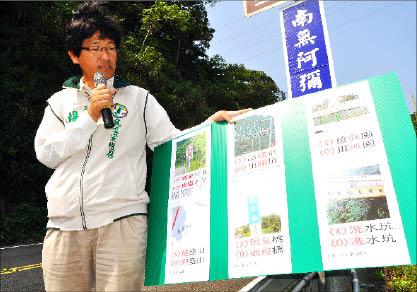Yiong Cong-ziin (楊長鎮), director of the Democratic Progressive Party’s (DPP) Hakka affairs department, yesterday urged the government to conduct a thorough review of road signs for Hakka place names, saying they are often written using incorrect characters that significantly alter their meaning.
“Driving around Miaoli County, you will find road signs set up by either the county government or the Directorate-General of Highways using the wrong characters for these Hakka places,” Yiong said by telephone. “This shows the government’s lack of care and a disrespect for local culture.”
What’s more, these wrong signs often alter the original meaning of the names of those places, with this wrong information being passed on to visitors and the younger generation, he said.

Photo: Peng Chien-li, Taipei Times
“For example, the Xie’ai Ancient Trail (楔隘古道) in Miaoli’s Shitan Township (獅潭) has been written as ‘Xi’ai Ancient Trail’ (錫隘古道) for decades,” said Yiong, who is also running as the DPP’s legislative candidate in Miaoli County.
“‘Xie’ai’, or ‘shiap-ai’ in Hakka, refers to a supportive post placed between major defensive posts along the boundary between the Aboriginal domain and non--Aboriginal domain in the past when ethnic tensions were high,” he said.
However, writing it out as “xi’ai” (錫隘) might lead some people to think that it used to be a tin mine because the character “xi” (錫) means “tin,” Yiong said.
There’s also a mountain in Dahu Township (大湖) called Yaoposhan (鷂婆山), meaning “mountain of eagles,” because it’s a place frequented by eagles, he said.
“Yaopo” is pronounced as “yo’po” in Hakka.
However, the official road sign uses the character “yao” (耀) instead of “yao” (鷂), which is pronounced the same way in Mandarin, but are two different characters that differ in meaning, Yiong said.
“The government should make an effort to survey all Hakka place names and correct all the mistakes to better preserve local culture,” he said.
At a separate setting, Chen Ban (陳板), a long-time researcher and advocate for the preservation of Hakka culture, said that he fully supported the idea that official signs should carry the original and correct place names, as a way to pass on the culture and history of a place.
Chen said he heads a project that has been conducting a survey of Hakka place names for six years now for the Council for Hakka Affairs.
“I would like to call on the council to take action and change these road signs, especially as we’ve been doing this project for six years now,” he said.

Chinese Nationalist Party (KMT) Chairman Eric Chu (朱立倫), spokeswoman Yang Chih-yu (楊智伃) and Legislator Hsieh Lung-chieh (謝龍介) would be summoned by police for questioning for leading an illegal assembly on Thursday evening last week, Minister of the Interior Liu Shyh-fang (劉世芳) said today. The three KMT officials led an assembly outside the Taipei City Prosecutors’ Office, a restricted area where public assembly is not allowed, protesting the questioning of several KMT staff and searches of KMT headquarters and offices in a recall petition forgery case. Chu, Yang and Hsieh are all suspected of contravening the Assembly and Parade Act (集會遊行法) by holding

PRAISE: Japanese visitor Takashi Kubota said the Taiwanese temple architecture images showcased in the AI Art Gallery were the most impressive displays he saw Taiwan does not have an official pavilion at the World Expo in Osaka, Japan, because of its diplomatic predicament, but the government-backed Tech World pavilion is drawing interest with its unique recreations of works by Taiwanese artists. The pavilion features an artificial intelligence (AI)-based art gallery showcasing works of famous Taiwanese artists from the Japanese colonial period using innovative technologies. Among its main simulated displays are Eastern gouache paintings by Chen Chin (陳進), Lin Yu-shan (林玉山) and Kuo Hsueh-hu (郭雪湖), who were the three young Taiwanese painters selected for the East Asian Painting exhibition in 1927. Gouache is a water-based

Taiwan would welcome the return of Honduras as a diplomatic ally if its next president decides to make such a move, Minister of Foreign Affairs Lin Chia-lung (林佳龍) said yesterday. “Of course, we would welcome Honduras if they want to restore diplomatic ties with Taiwan after their elections,” Lin said at a meeting of the legislature’s Foreign Affairs and National Defense Committee, when asked to comment on statements made by two of the three Honduran presidential candidates during the presidential campaign in the Central American country. Taiwan is paying close attention to the region as a whole in the wake of a

OFF-TARGET: More than 30,000 participants were expected to take part in the Games next month, but only 6,550 foreign and 19,400 Taiwanese athletes have registered Taipei city councilors yesterday blasted the organizers of next month’s World Masters Games over sudden timetable and venue changes, which they said have caused thousands of participants to back out of the international sporting event, among other organizational issues. They also cited visa delays and political interference by China as reasons many foreign athletes are requesting refunds for the event, to be held from May 17 to 30. Jointly organized by the Taipei and New Taipei City governments, the games have been rocked by numerous controversies since preparations began in 2020. Taipei City Councilor Lin Yen-feng (林延鳳) said yesterday that new measures by